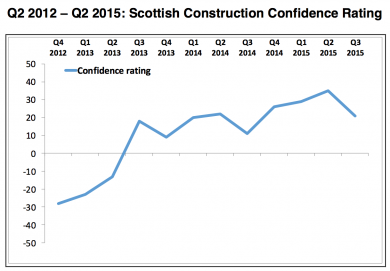During the third quarter of 2015, confidence among firms slid 14 points to stand at plus 21 on Scottish Construction Monitor index.
It ends a run of fourth consecutive quarters where the number of firms saying they remain confident that workloads will rise has steadily grown and peaked at an index score of plus 35.
The percentage of respondents who are more confident about their prospects for the next 12 months compared to the past year slid from 64% last quarter to 51% this quarter.
Conversely, the percentage of respondents less confident about their firm’s future prospects has risen from 4% in Q2 2015 to 16% this quarter.
Members of the leading trade body north of the border, the Scottish Building Federation, also highlighted concern about the growing use of performance guarantees or bonds as a condition of carrying out new work.
This is putting an extra squeeze on already tight cash flows, particularly for smaller firms in Scotland.
Almost half of the firms asked to provide a bond reported that its wording had created difficulties in obtaining the bond from the guarantor, typically a bank.
Scottish Building Federation commercial director Ian Honeyman said: “The decline in industry confidence this quarter underlines employer concerns about the long-term sustainability of the growth in construction output we’ve witnessed over recent months – and the growing issue of skills and capacity shortages within the industry.
“Our survey suggests that too many contracts are still subject to bank guarantees and this is having a negative impact on cash flow – particularly for smaller companies which can least afford to keep significant reserves of cash on deposit in their bank account.
“Instead, we would like to see the industry move towards a situation where a standardised form of insurance backed guarantee becomes the norm.
“This will give the client suitable protection against a contractor failing to fulfil its contractual commitments while reducing the barriers to particularly smaller construction companies tendering for larger contracts.”



















































.gif)

